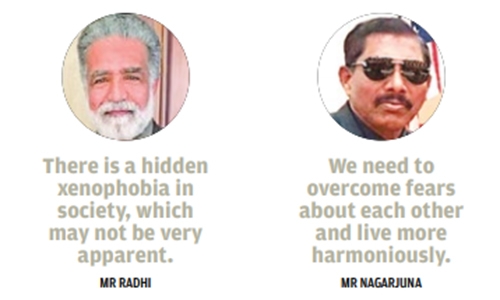Workshops urged to tackle ‘rising xenophobic attitude’
The tightening financial situation since the oil price collapse a few years ago has been contributing to a rise in xenophobia among the workforce, according to prominent trade union leaders. Representatives from prominent trade unions said that they have been lately observing a rise in xenophobic tendencies in the country’s workforce. They said that xenophobia exists among both expatriates and Bahrainis, adding that the phenomenon is not widespread but is ‘hidden’.
This, they said, is a contributing factor to clashes between employers and employees in some cases. Speaking to Tribune, General Federation of Bahrain Trade Union’s Karim Radhi said: “There is a hidden xenophobia in society which may not be very apparent. There is fear amongst migrants about locals and the other way round. “I think everyone who is coming to Bahrain can be given some workshops on what to expect and help them ease their worries.”
“Among locals there is a different type of fear. For example, I believe there is an irrational fear of remittances and how migrants send their money to their home country. According to LMRA statistics, companies are saving over BD 300 per person by hiring migrants. “This means, despite whatever is being sent home, the country is saving much more money compared to what is being lost in remittances. Of course nationals need to be given jobs but when talking about things like remittances the whole picture must be presented.
“I also hear complaints as to how migrants are leading to traffic jams and they shouldn’t be allowed to drive, but these are all irrational fears that arise out of xenophobia.” “Recently, I was taking a walk in the park and I witnessed a local boy drinking water. He noticed an expat walking by and he spat the water on him. I described this experience on my social media, condemning the actions of the boy and calling this xenophobia. “I got a huge backlash and many were in denial. These are the situations that remind me that xenophobia exists.
Often things are not this extreme and it may be seen outwardly like in this case, but it does exist on a deeper level among some and that is what often leads to many of the employee-employer disputes,” Mr Radhi said. General Trade Union of Service Workers Adviser Thampi Nagarjuna said that workshops and training must be offered to all migrants, especially the labourers before they move abroad to help them cope with the change. “Xenophobia is at its highest when people have just moved in. They are tense about the new surroundings and people.
Workshops designed to help them understand what to expect would help immensely,” he said. He said that the phenomenon is something that is present in every part of the world. “This isn’t something new or something that is unique to certain places, its always been there throughout history and it is present in every place in the world. “In my own hometown, there are instances of xenophobic behaviour between different villagers. Fear is something that is there among all people. But there are ways to help us overcome fear and live more harmoniously.”
Related Posts

